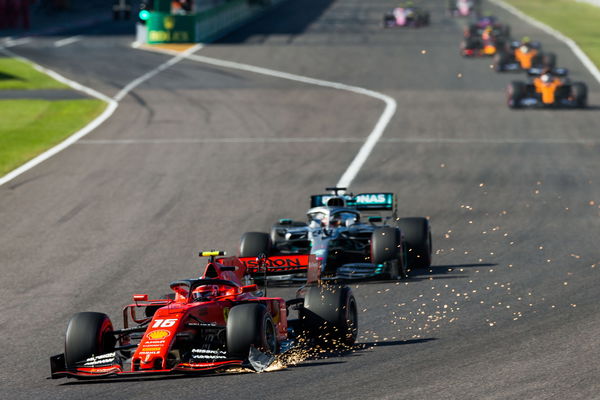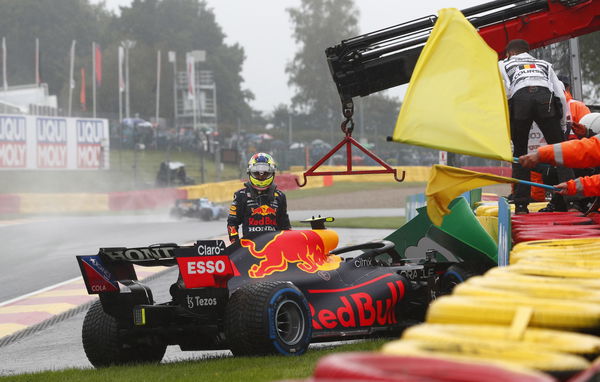
Reuters
Formula One F1 – Hungarian Grand Prix – Hungaroring, Budapest, Hungary – August 1, 2021 Mercedes’ Valtteri Bottas collides with Red Bull’s Sergio Perez Pool via REUTERS/Peter Kohalmi

Reuters
Formula One F1 – Hungarian Grand Prix – Hungaroring, Budapest, Hungary – August 1, 2021 Mercedes’ Valtteri Bottas collides with Red Bull’s Sergio Perez Pool via REUTERS/Peter Kohalmi
The complicated 2020 F1 season witnessed loads of strange circuits returning or debuting in F1, which added an element of refreshment for the fans. And a lot of the Grand Prix weekend ended up being a huge success as well.
Watch What’s Trending Now!
Consequently, the governing body believed that they could retain a few of them along with the circuits already under contract in 2021, which shaped up to be a record-breaking season comprising 23 race weekends.
However, the enduring pandemic meant that a lot of hosts including Canada and Australia had to back out. The latest circuit to join the list was the classic Suzuka, situated in Japan, which led to major tweaking to the calendar.
ADVERTISEMENT

Getty
Charles Leclerc of Ferrari and France during the F1 Grand Prix of Japan at Suzuka Circuit in Suzuka, Japan. (Photo by Peter J Fox/Getty Images)
With options potentially running thin, F1 had to bring the 2021 season’s calendar down to 22 races again. It is a shame, considering the sport’s desperate efforts into providing almost weekly actions for the fans. Interestingly, it will come as a blessing in disguise for the teams and their drivers.
Of course, for the drivers, it’s the extra break. The number of triple headers this season has now come down to three, with one already down and two more to go. However, for the teams, their relief is purely related to a possible increase in financial stability.
ADVERTISEMENT
How the 22-race calendar will help the F1 teams?
The budget cap made its entry into the 2021 F1 season, and a lot of teams have had to go through major cost-cutting. What’s more, Red Bull are certainly with the budget cap limit, after both their drivers suffered a total of four accidents in the last three race weekends, pulling a chunk of money out of their pockets.
ADVERTISEMENT
Well, this clause in the agreement regarding the budget cap could help them. As of 2021, the budget cap limit was around $145 million for 21 races, according to Motorsport-Total.

Reuters
Formula One F1 – Belgian Grand Prix – Spa-Francorchamps, Spa, Belgium – August 29, 2021 Red Bull’s Sergio Perez crashes out before the start of the race REUTERS/Johanna Geron
And with each additional race, the limit rises by $1.2 million. Hence, on paper ahead of the season, F1 set the limit at approximately $147.4 million for the teams, considering the two additional races.
ADVERTISEMENT
Now, with the exclusion of Japan, the number of race weekends is down to 22 races. And one might naturally assume that the budget cap, too, will reduce to $146.2 million. Interestingly, that’s not the case.
Top Stories
“Gotta Put a Ring on Her”: Daniel Ricciardo Grabs Limelight With Actor GF Heidi Berger as 3 Adorable Pictures Leave Fans Awestruck

21 Years After Break-Up, Lewis Hamilton Emotionally Reminisces About Ex-girlfriend Danielle Lloyd to Reflect on Major Heartbreak: “The Scar Is There”

Who Is Oscar Piastri’s Father, Chris Piastri? Co-Founder of Multibillion Dollar Automotive Company

Sebastian Vettel Terrorised F1 Hero Michael Schumacher at the Nascent Age of 12

Fernando Alonso’s Buried Jealousy Against Lewis Hamilton Ripped to Shreds With Slap of Reality

According to a clause in the agreement, irrespective of the changes to the calendar, the budget cap will remain unchanged. Meaning, the teams will now receive $1.2 million as a bonus amidst Japan’s exit. Hence, will the hefty bonus of $1.2 million assist the teams in the development of their 2021 project?
Watch Story: Biggest Crashes From 2020 Featuring Leclerc, Vettel & Grosjean
ADVERTISEMENT
ADVERTISEMENT
ADVERTISEMENT
ADVERTISEMENT